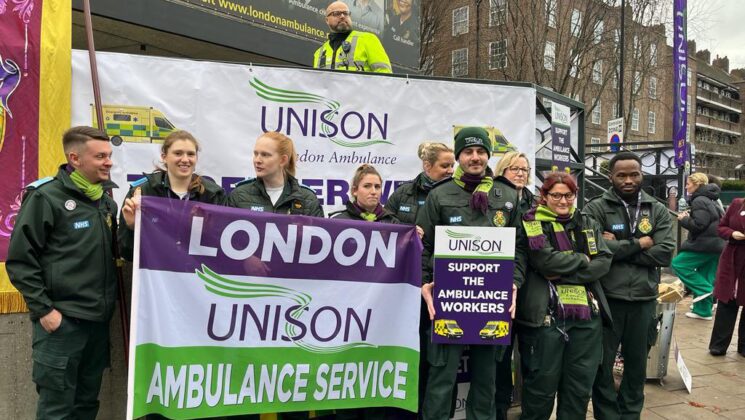Nurses will join blood collection workers, healthcare assistants, cleaners, porters and ambulance staff in a new day of walkouts over pay next month, says UNISON today (Wednesday).
The union says the strike on Wednesday 8 March is a serious escalation of the dispute and a direct result of the government’s failure to hold proper pay talks with health unions.
Health workers at NHS Blood and Transplant, Great Ormond Street Hospital, the Tavistock and Portman NHS Foundation Trust, Liverpool Women’s Hospital and the Bridgewater Community Trust will now be among those now walking out for the first time.
They’ll be joined by ambulance staff at four services in England – South Central, East of England, West Midlands and East Midlands, also now able to take action following their successful strike vote last week.
This means staff will be on picket lines in all but one ambulance service in England in two weeks’ time. Colleagues working for ambulance services in London, Yorkshire, the North East, North West and South West – who have already taken action on four previous occasions – will also walk out on 8 March.
Up to 32,000 NHS workers belonging to UNISON in England are now able to take strike action. This follows the re-balloting of ten NHS employers in England, where the strike vote fell just short of the legal threshold last year.
NHS workers at two trusts in Liverpool (the Liverpool University Hospitals NHS Foundation Trust and the city’s Heart and Chest Hospital) will also join the 8 March strike.
UNISON general secretary Christina McAnea said: “Unfortunately for patients, staff and anyone that cares about the NHS, the strikes go on.
“There can be no pick-and-mix solution. NHS workers in five unions are involved in strike action over pay, staffing and patient care.
“Choosing to speak to one union and not others won’t stop the strikes and could make a bad situation much worse.
“The entire NHS team is absolutely determined to stand firm for better patient care. They’ll be furious at the government’s failure to invite their union in for talks. Not least because a deal just for nurses cannot possibly work, and nurses belong to other unions too.
“Next month staff in all but one of the ambulance services in England will walk out. They’ll be joined by thousands more NHS colleagues, many striking for the first time. The action by NHS Blood and Transport Staff will hit blood collection across the country too.
“By holding solo talks, the prime minister is condemning patients to many more months of disruption. Health workers will want assurances from ministers that they have no intention of ripping up pay agreements in the NHS. Any attempt to do so, would be an incredibly serious move.
“The government now has several billion pounds more than it thought it had in its coffers. Now he has the cash, Rishi Sunak must speak to everyone involved if the dispute is to end.
“Governments elsewhere in the UK know how pay deals can be done. Rishi Sunak must copy their example, hold proper pay talks and allow everyone to get back to work.”
Notes to editors:– Last month UNISON re-balloted ambulance workers at five services in England (South East Coast, South Central, East of England, West Midlands and East Midlands) and the Welsh Ambulance Service. Unfortunately, the vote at South East Coast fell short of the legal threshold. Staff at NHS Blood and Transplant, London’s Great Ormond Street Hospital, Tavistock and Portman NHS Foundation Trust, Liverpool Women’s Hospital and the North West-based Bridgewater Community Trust were also asked to vote again over pay and staffing, and now also have mandates to strike.– UNISON ambulance workers took strike action on 21 December, 11 and 23 January, and 10 February. Health workers at two Liverpool trusts (the University Hospitals Trust and the city’s Heart and Chest Hospital) walked out on 21 December and 23 January. Staff at the National Institute for Health and Care Excellence also went on strike on 17 January.
– Last week, the Scottish government made a pay offer to health unions for the next pay year (2023/24), which UNISON has recommended that its members accept. This would see most NHS workers receive increases of more than 8% in April. And mean that over the two years (2022/23 and 2023/24) nurses in Scotland will have got a pay rise of more than 14% and the lowest paid NHS workers an increase of close to 20%. In Wales, UNISON is consulting on an offer from the government to NHS workers of an additional 3% this year. Health and social service workers in Northern Ireland have taken three days of strike action on 12 December, 26 January and 21 February.
– UNISON is the UK’s largest union and the largest union in the NHS and in the ambulance sector. It has more than 1.3 million members providing public services – in education, local government, the NHS, police service and energy. They are employed in the public, voluntary and private sectors.
Media contacts:Liz Chinchen M: 07778 158175 E: press@unison.co.uk
Fatima Ayad M: 07508 080383 E: f.ayad@unison.co.uk
Sophie Goodchild M: 07767 325595 E: s.goodchild@unison.co.uk

